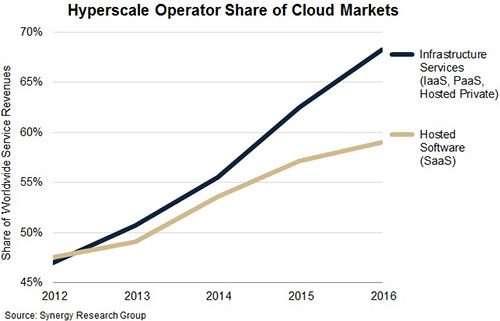Businesses are increasingly migrating their IT workloads to the cloud, benefiting hyperscale cloud operators the most, finds a new study from Synergy Research Group.
Currently, there are 24 cloud operators that fit the bill, according to the technology analyst firm. In general, a hyperscale cloud providers have a broad data center footprint, each with 45 or more data centers across the globe. They operate at least two data centers in each major region, namely North America, Latin America, Europe, Middle East and Africa (EMEA) and Asia-Pacific (APAC).
Protecting your company’s data is critical. Cloud storage with automated backup is scalable, flexible and provides peace of mind. Cobalt Iron’s enterprise-grade backup and recovery solution is known for its hands-free automation and reliability, at a lower cost. Cloud backup that just works.

Typically, they have hundreds of thousands of servers at their disposal, or in the case of cloud giants Amazon and Google, millions of servers. Combined, these 24 hyperscale cloud companies, a group that also includes Microsoft and IBM, operate nearly 320 data centers worldwide. Amazon Web Services (AWS), for example, operates 42 “Availability Zones,” each with one to three data centers.
That reach, combined with the sheer amount of computing resources available to them, have made them the go-to cloud vendors.
In 2016, hyperscale cloud operators captured 68 percent of the cloud infrastructure market, which includes infrastructure as a service (IaaS), platform as a service (PaaS) and private hosted cloud services. They also snagged 59 percent of software as a service (SaaS) revenues.
Flip the calendar back to 2012, and hyperscale clouds generated 47 percent of each respective market’s revenues.
“Synergy’s new research shows that hyperscale operators are increasingly dominating IT markets in a variety of ways,” said John Dinsdale, a Synergy Research Group chief analyst and research director, in a research note sent to Datamation. “They are hoovering up cloud services market share; they are increasing mindshare of enterprise CTOs; and they are increasing their share and influence of spend on data center infrastructure hardware.”
And for today’s biggest cloud company, it appears that there’s nowhere to go but up. “Synergy’s latest forecast shows that the hyperscale operators’ market control and influence will only increase over the next five years,” Dinsdale added.
Hyperscale clouds are also cementing their hold on the market. Recently, Synergy observed that the rise in Microsoft, Google and IBM cloud sales during the fourth quarter of 2016 (on year-over-year basis) came at the expense of smaller players. Amazon, the leading public IaaS and PaaS provider, was barely affected.
Pedro Hernandez is a contributing editor at Datamation. Follow him on Twitter @ecoINSITE.
Huawei’s AI Update: Things Are Moving Faster Than We Think
FEATURE | By Rob Enderle,
December 04, 2020
Keeping Machine Learning Algorithms Honest in the ‘Ethics-First’ Era
ARTIFICIAL INTELLIGENCE | By Guest Author,
November 18, 2020
Key Trends in Chatbots and RPA
FEATURE | By Guest Author,
November 10, 2020
FEATURE | By Samuel Greengard,
November 05, 2020
ARTIFICIAL INTELLIGENCE | By Guest Author,
November 02, 2020
How Intel’s Work With Autonomous Cars Could Redefine General Purpose AI
ARTIFICIAL INTELLIGENCE | By Rob Enderle,
October 29, 2020
Dell Technologies World: Weaving Together Human And Machine Interaction For AI And Robotics
ARTIFICIAL INTELLIGENCE | By Rob Enderle,
October 23, 2020
The Super Moderator, or How IBM Project Debater Could Save Social Media
FEATURE | By Rob Enderle,
October 16, 2020
FEATURE | By Cynthia Harvey,
October 07, 2020
ARTIFICIAL INTELLIGENCE | By Guest Author,
October 05, 2020
CIOs Discuss the Promise of AI and Data Science
FEATURE | By Guest Author,
September 25, 2020
Microsoft Is Building An AI Product That Could Predict The Future
FEATURE | By Rob Enderle,
September 25, 2020
Top 10 Machine Learning Companies 2020
FEATURE | By Cynthia Harvey,
September 22, 2020
NVIDIA and ARM: Massively Changing The AI Landscape
ARTIFICIAL INTELLIGENCE | By Rob Enderle,
September 18, 2020
Continuous Intelligence: Expert Discussion [Video and Podcast]
ARTIFICIAL INTELLIGENCE | By James Maguire,
September 14, 2020
Artificial Intelligence: Governance and Ethics [Video]
ARTIFICIAL INTELLIGENCE | By James Maguire,
September 13, 2020
IBM Watson At The US Open: Showcasing The Power Of A Mature Enterprise-Class AI
FEATURE | By Rob Enderle,
September 11, 2020
Artificial Intelligence: Perception vs. Reality
FEATURE | By James Maguire,
September 09, 2020
Anticipating The Coming Wave Of AI Enhanced PCs
FEATURE | By Rob Enderle,
September 05, 2020
The Critical Nature Of IBM’s NLP (Natural Language Processing) Effort
ARTIFICIAL INTELLIGENCE | By Rob Enderle,
August 14, 2020

Datamation is the leading industry resource for B2B data professionals and technology buyers. Datamation's focus is on providing insight into the latest trends and innovation in AI, data security, big data, and more, along with in-depth product recommendations and comparisons. More than 1.7M users gain insight and guidance from Datamation every year.
Advertise with TechnologyAdvice on Datamation and our other data and technology-focused platforms.
Advertise with Us
Property of TechnologyAdvice.
© 2025 TechnologyAdvice. All Rights Reserved
Advertiser Disclosure: Some of the products that appear on this
site are from companies from which TechnologyAdvice receives
compensation. This compensation may impact how and where products
appear on this site including, for example, the order in which
they appear. TechnologyAdvice does not include all companies
or all types of products available in the marketplace.